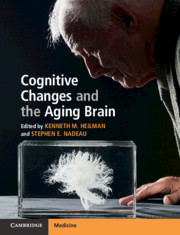Book contents
- Cognitive Changes and the Aging Brain
- Cognitive Changes and the Aging Brain
- Copyright page
- Dedication
- Contents
- Contributors
- Chapter 1 Introduction
- Chapter 2 Anatomic and Histological Changes of the Aging Brain
- Chapter 3 Cellular and Molecular Mechanisms for Age-Related Cognitive Decline
- Chapter 4 Neuroimaging of the Aging Brain
- Chapter 5 Changes in Visuospatial, Visuoperceptual, and Navigational Ability in Aging
- Chapter 6 Chemosensory Function during Neurologically Healthy Aging
- Chapter 7 Memory Changes in the Aging Brain
- Chapter 8 Aging-Related Alterations in Language
- Chapter 9 Changes in Emotions and Mood with Aging
- Chapter 10 Aging and Attention
- Chapter 11 Changes in Motor Programming with Aging
- Chapter 12 Alterations in Executive Functions with Aging
- Chapter 13 Brain Aging and Creativity
- Chapter 14 Attractor Network Dynamics, Transmitters, and Memory and Cognitive Changes in Aging
- Chapter 15 Mechanisms of Aging-Related Cognitive Decline
- Chapter 16 The Influence of Physical Exercise on Cognitive Aging
- Chapter 17 Pharmacological Cosmetic Neurology
- Chapter 18 Cognitive Rehabilitation in Healthy Aging
- Chapter 19 Preventing Cognitive Decline and Dementia
- Index
- References
Chapter 7 - Memory Changes in the Aging Brain
Published online by Cambridge University Press: 30 November 2019
- Cognitive Changes and the Aging Brain
- Cognitive Changes and the Aging Brain
- Copyright page
- Dedication
- Contents
- Contributors
- Chapter 1 Introduction
- Chapter 2 Anatomic and Histological Changes of the Aging Brain
- Chapter 3 Cellular and Molecular Mechanisms for Age-Related Cognitive Decline
- Chapter 4 Neuroimaging of the Aging Brain
- Chapter 5 Changes in Visuospatial, Visuoperceptual, and Navigational Ability in Aging
- Chapter 6 Chemosensory Function during Neurologically Healthy Aging
- Chapter 7 Memory Changes in the Aging Brain
- Chapter 8 Aging-Related Alterations in Language
- Chapter 9 Changes in Emotions and Mood with Aging
- Chapter 10 Aging and Attention
- Chapter 11 Changes in Motor Programming with Aging
- Chapter 12 Alterations in Executive Functions with Aging
- Chapter 13 Brain Aging and Creativity
- Chapter 14 Attractor Network Dynamics, Transmitters, and Memory and Cognitive Changes in Aging
- Chapter 15 Mechanisms of Aging-Related Cognitive Decline
- Chapter 16 The Influence of Physical Exercise on Cognitive Aging
- Chapter 17 Pharmacological Cosmetic Neurology
- Chapter 18 Cognitive Rehabilitation in Healthy Aging
- Chapter 19 Preventing Cognitive Decline and Dementia
- Index
- References
Summary
This chapter reviews normal aging-related changes in memory processes, including short-term or working memory and episodic and semantic long-term memory. Definitions of the boundaries of normal vs. pathological long-term memory changes with advancing age are provided, including Benign Senescent Forgetfulness, Age Associated Memory Impairment, and Mild Cognitive Impairment. Memory decline is contrasted with decline in other cognitive processes, including processing speed and spatial cognition. Aging-related decline is similar for verbal and visual long-term memory, including more traditional memory measures such as list-learning, and for tests that are designed to simulate everyday memory abilities such as name–face association. Aging-related decline in long-term memory appears to be a function of the amount initially learned, with little evidence of accelerated forgetting in association with normal advancing age. Recognition performance remains high and relatively stable over successive age cohorts. Last, the factor structure of measures of short- and long-term memory, as well as episodic and semantic memory, supports the differentiation of these constructs and shows stability of these unique domains across the adult age range.
Keywords
- Type
- Chapter
- Information
- Cognitive Changes and the Aging Brain , pp. 95 - 105Publisher: Cambridge University PressPrint publication year: 2019

